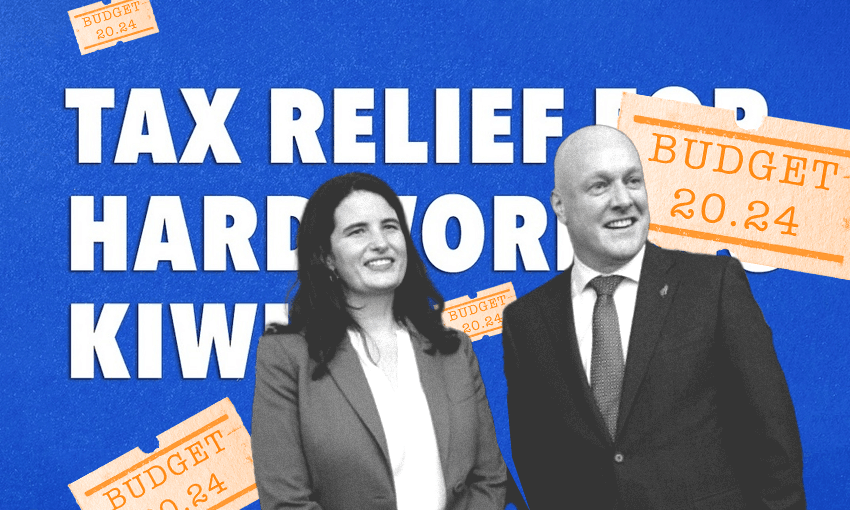There’s a reason why National prefers the phrase to the more standard – and accurate – ‘tax cuts’, writes Max Rashbrooke.
The American pollster and strategist Frank Luntz is famous – or infamous, depending on your point of view – for coining the phrase “death tax” to describe estate duties. He also promoted the use of “climate change” rather than “global warming”, the former being less likely to frighten people into action; later, he tried to frame attempts to widen healthcare coverage as “a government takeover” or “coup”.
Luntz is not, evidently, on the side of the angels. But he understands, better than most, the power of language to shape reality: to evoke emotions, to elicit certain responses, to change the very way we see the world. “Death taxes”, reportedly, engender far more resentment than “inheritance taxes”. No wonder Luntz’s bestselling book was called Words That Work.
Closer to home, the clearest current attempt to manipulate language in this way is National’s thus-far successful campaign to rebrand tax cuts as “tax relief”. This phrase may have stood out as you scanned the news; more likely, it slinked its way into your consciousness unnoticed, blending into the background. What it does, subtly but unmistakably, is position tax as a bad thing: something from which one needs to be relieved. “Less tax? Oh what a relief.”
This is hardly a neutral way to describe matters. Not everyone, admittedly, fills out their tax return, or contemplates their PAYE details, with joy in their heart and a song on their lips. But most of us are at least partly pleased to pay tax, to fund all the good things government does. Even though I am not, in general, an especially high earner, I don’t feel relief at the thought of my taxes being cut: I’m much more worried about how those less fortunate will cope if the cuts lead to weaker public services.
National, of course, will keep using the phrase, as is its right. But no-one with the job of describing politics neutrally or accurately should do so. Except for direct quotes, the media should not, and in particular RNZ – our state broadcaster – should not. Especially when there is an indisputably neutral and accurate alternative: tax cuts.
Words, in short, matter. Just look at the lengths to which National went to get the phrase “ute tax” into the vernacular. The ultimate prize, in this game, is not simply to say things your own way, but to get others – in particular the media – to say things your way.
Journalists might argue – with some justice – that Labour, when in government, didn’t necessarily play fair with language either. National’s “ute tax” was, in Labour’s original hands, the “clean car discount”: the positive inverse of National’s negative. Some more neutral term was needed: though clunky, the “feebate” – half fee imposed on polluting vehicles, half rebate for cleaner ones – was probably the best candidate.
The closer one looks, the more these linguistic sleights of hand become apparent. It’s not just “tax relief”: the state’s levies are often described, even in ostensibly neutral publications, as “the tax burden”. A wholly negative word is, once again, used to describe something that isn’t so. The “tax take”, or “tax obligations”, would be nearer the mark.
Reframing can, of course, be a force for good. One of the most successful campaigns in recent memory foundered when marching under the banner of “gay marriage”, but enjoyed far greater success when recast as “marriage equality”. Here, happily, language and accuracy went hand-in-hand: the fundamental moral point of the campaign was not that a specific group should get some specific privilege, but rather that something of value should be made universally – and equally – available.
None of this is to suggest that language is all-powerful. Something desperately unpopular isn’t going to become suddenly beloved just because it’s given a new name. Sometimes progressives make that mistake, thinking, for instance, that a capital gains tax will magically become more acceptable if renamed a “speculators’ tax” or similar. It won’t, not least because there is only so far words can be pushed: over-stretch them, and one strains credulity as well as language. The public, rightly, won’t take the bait, and the media won’t either.
It’s better, surely, to make the obvious point about a capital gains tax: that income is income. (This would echo the “love is love” tagline from the marriage equality campaign.) Income from selling investment properties is income; income from a salary is income. We should tax it all equally. And wouldn’t it be great if we did so? Now that is something that – although I wouldn’t expect the media to use this term – I really would find a relief.





